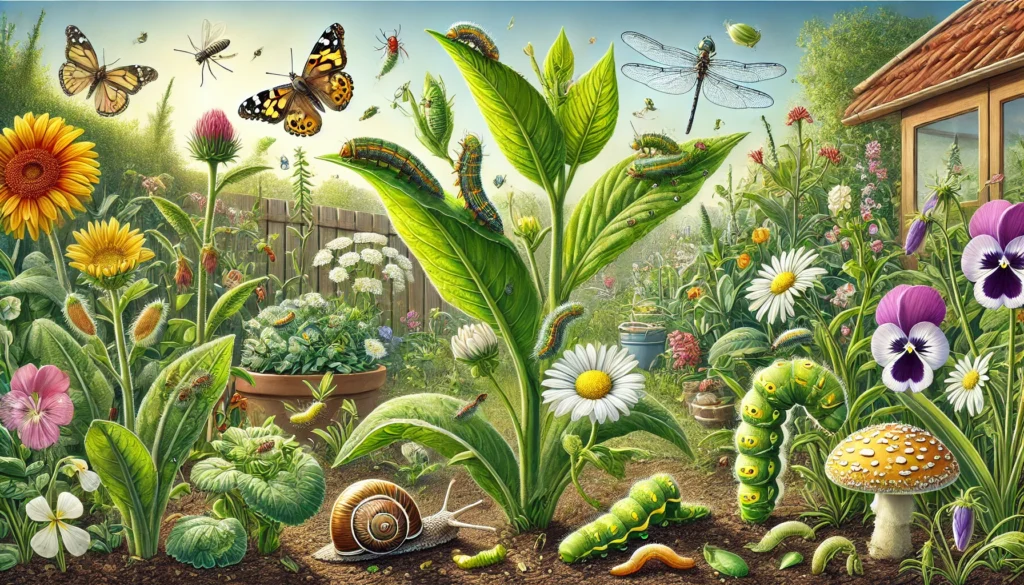Gardens Pest Control: 10 Proven Strategies to Protect Your Plants
Gardens Pest Control: Effective Strategies to Protect Your Plants
Gardening is a rewarding activity that brings joy and satisfaction to many. However, garden pests can quickly turn your lush, thriving garden into a battlefield.
These unwelcome intruders can damage plants, spread diseases, and significantly reduce your harvest.
This comprehensive guide will explore practical strategies for garden pest control, helping you maintain a healthy and flourishing garden.
Understanding Common Garden Pests
The first step in managing garden pest control is understanding the common culprits. Here are some pests you are likely to encounter:
- Aphids: These small, sap-sucking insects are often found on new growth. They can cause leaves to turn yellow and transmit plant viruses.
- Slugs and Snails: These mollusks feed on leaves, leaving large, irregular holes and can cause significant damage to young plants.
- Caterpillars: The larvae of butterflies and moths, caterpillars chew on leaves and can defoliate plants if left unchecked.
- Spider Mites: Tiny arachnids that cause stippling on leaves, leading to yellowing and leaf drop.
- Whiteflies: Small, white, flying insects that suck plant juices and excrete honeydew, which can lead to sooty mold growth.
Monitoring and Early Detection
Regular monitoring is crucial for early pest detection. Inspect your plants weekly, paying special attention to the undersides of leaves and new growth where pests often hide. Use a magnifying glass to spot tiny insects like spider mites. Early detection allows you to address pest problems before they become severe.
Encouraging Natural Predators
One of the most influential and eco-friendly ways to control garden pests is to encourage natural predators. Beneficial insects can help keep pest populations in check.
Here are some beneficial insects to attract to your garden:
- Ladybugs: These insects feed on aphids and other small insects. You can attract ladybugs by planting flowers like dill, fennel, and yarrow.
- Lacewings: Lacewing larvae consume a variety of garden pests, including aphids, caterpillars, and mealybugs. To attract lacewings, plant flowers like coreopsis and sweet alyssum.
- Predatory Wasps: These wasps target caterpillars and other soft-bodied insects. Planting nectar-rich flowers like marigolds and daisies can attract predatory wasps to your garden.
Using Organic Pesticides
Organic pesticides are a safer alternative to chemical pesticides and can effectively manage pests without harming the environment. Here are some popular organic options:
- Neem Oil: Derived from the neem tree, neem oil is effective against a wide range of pests and acts as a fungicide. It disrupts insects’ life cycles, preventing them from feeding and reproducing.
- Insecticidal Soap: Made from potassium salts of fatty acids, insecticidal soap works well on soft-bodied insects like aphids and spider mites. It breaks down the insect’s outer layer, causing dehydration and death.
- Diatomaceous Earth: This natural powder, made from fossilized remains of diatoms, dehydrates and kills crawling insects like slugs, snails, and ants.
Implementing Physical Barriers
Physical barriers can prevent pests from reaching your plants. Here are some effective methods:
- Row Covers: Lightweight fabric covers protect plants from insects while allowing light and water to pass through. They are handy for preventing pests like cabbage worms and beetles.
- Copper Tape: Copper deters slugs and snails. Placing copper tape around plant bases or garden beds can help keep these pests at bay.
- Netting: Netting can protect fruits and vegetables from birds and larger pests. It is especially useful for crops like berries and tomatoes.
Practicing Crop Rotation
Crop rotation is a traditional agricultural practice that involves changing the location of crops each season. This method helps break the life cycle of pests and reduces the buildup of pests and diseases in the soil. For example, rotating between leafy greens, root vegetables, and legumes can disrupt the habitat of pests that target specific plant families.
Maintaining Garden Hygiene
Keeping your garden clean can prevent pest problems. Regularly remove debris, fallen leaves, and dead plants to eliminate hiding spots for pests. Compost plant material away from your garden to avoid attracting pests. Additionally, sterilize garden tools and pots to prevent the spread of diseases and pests.
Companion Planting
Companion planting involves growing certain plants together to repel pests. Here are some effective companion plants:
- Marigolds: These flowers deter nematodes and aphids. Plant marigolds around vegetable beds to protect your crops.
- Basil: Basil repels mosquitoes and flies and improves the flavor of tomatoes. Plant basil near tomato plants for dual benefits.
- Garlic: Garlic repels aphids, spider mites, and other pests. Plant garlic around the perimeter of your garden to create a natural barrier.
Hand-Picking Pests
Hand-picking can be an effective control method for larger pests like caterpillars, slugs, and beetles. Wear gloves and inspect your plants regularly. Remove pests by hand and drop them into a bucket of soapy water. This method is labor-intensive but can be highly effective for small gardens.
Applying Biological Controls
Biological controls involve using natural enemies of pests to keep their populations in check. Here are some biological control methods:
- Bacillus thuringiensis (Bt) is a bacterial insecticide that is effective against caterpillars. It produces toxins that target the larvae’s digestive system, causing them to stop feeding and die.
- Nematodes: Beneficial nematodes are microscopic worms that target soil-dwelling pests like grubs and root weevils. They enter the pest’s body and release bacteria that kill the host.
Creating a Healthy Garden Ecosystem
A healthy garden ecosystem can naturally resist pests. Here are some tips for creating a balanced garden environment:
- Diverse Plantings: Plant a variety of species to create a resilient garden. Diverse plantings can support a range of beneficial insects and reduce the likelihood of pest infestations.
- Healthy Soil: Healthy soil supports healthy plants that can better resist pests. Improve soil health by adding organic matter, practicing crop rotation, and avoiding over-fertilization.
- Water Management: Proper watering can prevent pest problems. Water early in the morning allows plants to dry before nightfall, reducing the risk of fungal diseases.
Conclusion
By following these strategies, you can effectively manage garden pests and enjoy a healthy, productive garden.
Remember, the key to successful pest control is regular monitoring, early detection, and a combination of preventive and reactive measures.
Embrace eco-friendly practices, encourage beneficial insects, and maintain hygiene to create a thriving garden environment.
With these tools and techniques, you can protect your plants and reap the rewards of a bountiful harvest. Happy gardening!




